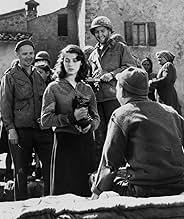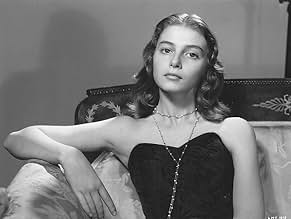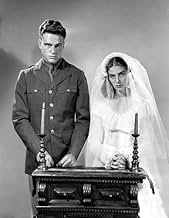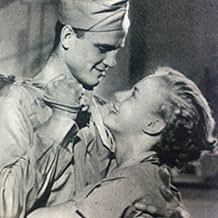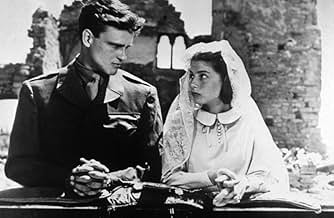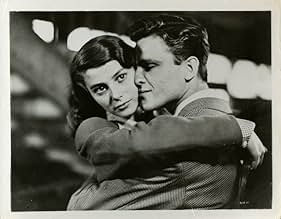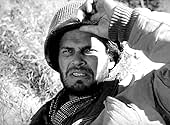A reluctant soldier, Peter, serves in Italy during WWII. He marries a local girl named Teresa and brings her to the US.A reluctant soldier, Peter, serves in Italy during WWII. He marries a local girl named Teresa and brings her to the US.A reluctant soldier, Peter, serves in Italy during WWII. He marries a local girl named Teresa and brings her to the US.
- Nominated for 1 Oscar
- 1 win & 2 nominations total
Lewis E. Ciannelli
- Cheyenne
- (as Lewis Cianelli)
Guido Martufi
- Sergio Russo
- (uncredited)
Featured reviews
Teresa was one of several marvelous 1951 films that fell off the radar screen.
Others were 'Night and the City', Jules Dassin's best film and possibly the best "film noir" ever made; 'Bullfighter and the Lady' (forget the "B" picture title, it was far better than the more famous 'The Brave Bulls'; and 'The Sound of Fury', titled also later the same year 'Try and Get Me'.
Teresa joins this list of scarcely seen gems. It was John Ericson's first film, but also his best. It does (as your reviewer says) resemble, in its depiction of parental smothering, 'Rebel Without a Cause'. However, Teresa was better. It does Fred Zinnemann proud. It was more sensitive than his touching film of two years earlier, 'The Search'.
What a year 1951 was for forgotten films that were better than many well-known, fondly remembered ones.
Others were 'Night and the City', Jules Dassin's best film and possibly the best "film noir" ever made; 'Bullfighter and the Lady' (forget the "B" picture title, it was far better than the more famous 'The Brave Bulls'; and 'The Sound of Fury', titled also later the same year 'Try and Get Me'.
Teresa joins this list of scarcely seen gems. It was John Ericson's first film, but also his best. It does (as your reviewer says) resemble, in its depiction of parental smothering, 'Rebel Without a Cause'. However, Teresa was better. It does Fred Zinnemann proud. It was more sensitive than his touching film of two years earlier, 'The Search'.
What a year 1951 was for forgotten films that were better than many well-known, fondly remembered ones.
A movie of note only because it stars a 19 year old Pier Angeli, who plays an Italian girl who meets an American solider (John Ericson) during the war, and marries him shortly thereafter. Angeli is bright-eyed and radiant, and I loved her conversations with her family in Italian, even if they weren't subtitled (maybe even more so because they weren't). Briefly seeing some of the sites in Rome was also nice. Unfortunately, Ericson is not nearly as good as Angeli. His character is admittedly difficult to play and not all that likeable, suffering from panic attacks, lack of confidence, and overall wishy-washiness. I loved how the film is honest in its depiction of war, showing us fear and cowardice, but unfortunately there are no real consequences to it. There are hints at the generation gap of the 1950's, but Ericson is no James Dean. The story telling from director Fred Zinnemann is too segmented and scattered, shifting from war film, to war bride film, to domineering mother film. Patricia Collinge is brilliant as the mom, particularly as we come to understand just how controlling she is, but it's at a point in the film where we just don't see the focus. The ending is also abrupt and unbelievable, as if the filmmakers didn't where to go with it either.
This is one depressing movie. So many of the lead characters are unpleasant, it really is difficult to know where to start. Let me begin with the most unpleasant character of all. John Ericson. He began as a Mama's Boy, joined the Army and became a misfit and coward, married and was a lousy husband, and finally walked out on his responsibilities as a father. Throughout the movie he whines, cries, and bitches about his lot in life. One has to wonder, even with the demands of war, how he ever got into the service. In his first encounter with the enemy - he is reduced to a quivering blob crying for his buddy and finally ending up in the loony ward with "battle fatigue".
He gets married to Pier Angeli (more later) in Italy just as the war ends. It baffles me how the Army would ever give permission to a guy like him to marry anyone. Once he rotates and his child-bride joins him at home in New York, we begin to discover what a worm he really is.
His mother dominates him and his father is a total wimp. His sister is a totally unlikable snot. The movie keeps flashing forward to his visit with a mental health pro at the VA. I don't know why. There is nothing they could do for him, although the writers would like you to think so. His problem is his mommy, but he attaches himself to anyone he thinks can prop him up. Aggh, it irritates me just to talk about him.
Pier Angeli, on the other hand, makes this movie. Her performance (at 18 yo) is dazzling. She is beautiful, sensitive, and totally sincere. She is clearly in love with Phillip, and wise enough to understand his problem - even if he won't.
It is, as I said, an unpleasant movie. But it was well shot and, I have to admit, a thoughtful movie. All in all, it was worth watching.
He gets married to Pier Angeli (more later) in Italy just as the war ends. It baffles me how the Army would ever give permission to a guy like him to marry anyone. Once he rotates and his child-bride joins him at home in New York, we begin to discover what a worm he really is.
His mother dominates him and his father is a total wimp. His sister is a totally unlikable snot. The movie keeps flashing forward to his visit with a mental health pro at the VA. I don't know why. There is nothing they could do for him, although the writers would like you to think so. His problem is his mommy, but he attaches himself to anyone he thinks can prop him up. Aggh, it irritates me just to talk about him.
Pier Angeli, on the other hand, makes this movie. Her performance (at 18 yo) is dazzling. She is beautiful, sensitive, and totally sincere. She is clearly in love with Phillip, and wise enough to understand his problem - even if he won't.
It is, as I said, an unpleasant movie. But it was well shot and, I have to admit, a thoughtful movie. All in all, it was worth watching.
This movie launched the feature film debut of four actors that would later go on to reach some success: Pier Angeli, John Ericson, Ralph Meeker, and Rod Steiger. It was also the first of three films for Bill Mauldin, a famous illustrator for "The Stars & Strips" (the military's newspaper during World War II). The only known actors in the movie were Patricia Collinge (The Little Foxes) and Peggy Ann Garner (A Tree Grows in Brooklyn).
The movie begins with Philip Cass (John Ericson) in a session with his VA psychologist, Frank (Rod Steiger), after returning from the war in Italy. He is having trouble fitting in with civilian life.
His story is related to us in flashback— While serving in Italy, Philip is clearly scared and unable to fight the German enemy until Sgt Dobbs (Ralph Meeker) steps in to guide him to fight. During a battle with the Germans, Philip's assignment is to hide in the bushes and let the Germans pass him by and then shoot up a flare for US soldiers to be ready to fight them down steam Unable to do even this, he is sent to a local hospital with battle fatigue. There he learns that Dobbs had been killed in the fight. Filled with guilt and shame, he hides his head in the pillow and cries.
While in Italy, he and a group of US soldiers are assigned to bivouac in an Italian home. There, he meets, dates, and falls in love with a young Italian girl, Teresa (Pier Angeli). They get married and have a honeymoon in Rome. When he ships out for the US, he must leave his war bride behind until she is authorized to join him.
This brings us back to his private battle in the US: He must find a job and make his own home. But, to do this, he must face his possessive mother, Patricia Collinge, and spineless father, Richard Bishop. There are some fine scenes in this movie, especially between, John Ericson and Pier Angeli. However, there is nothing subtle about the story, which "hits us over the head" rather than simply indicating its meaning.
The movie begins with Philip Cass (John Ericson) in a session with his VA psychologist, Frank (Rod Steiger), after returning from the war in Italy. He is having trouble fitting in with civilian life.
His story is related to us in flashback— While serving in Italy, Philip is clearly scared and unable to fight the German enemy until Sgt Dobbs (Ralph Meeker) steps in to guide him to fight. During a battle with the Germans, Philip's assignment is to hide in the bushes and let the Germans pass him by and then shoot up a flare for US soldiers to be ready to fight them down steam Unable to do even this, he is sent to a local hospital with battle fatigue. There he learns that Dobbs had been killed in the fight. Filled with guilt and shame, he hides his head in the pillow and cries.
While in Italy, he and a group of US soldiers are assigned to bivouac in an Italian home. There, he meets, dates, and falls in love with a young Italian girl, Teresa (Pier Angeli). They get married and have a honeymoon in Rome. When he ships out for the US, he must leave his war bride behind until she is authorized to join him.
This brings us back to his private battle in the US: He must find a job and make his own home. But, to do this, he must face his possessive mother, Patricia Collinge, and spineless father, Richard Bishop. There are some fine scenes in this movie, especially between, John Ericson and Pier Angeli. However, there is nothing subtle about the story, which "hits us over the head" rather than simply indicating its meaning.
My main reasons for seeing 'Teresa' were for Fred Zinnemann and the subject. Zinnemann made a number of great films, 'High Noon', 'The Day of the Jackal', 'A Man for All Seasons' and 'From Here to Eternity' and was a fine director. The subject was a bold one at the time and the studio could never be commended enough for tackling difficult contemporary issues for the time (some still relevant now) and mostly handling them uncompromisingly. The mixed reviews weren't enough to deter me.
On the most part, to me 'Teresa' was a very sincere and brave effort. A well done film with a lot of merits, the best of them quite brilliantly executed. It is not great and has a few big drawbacks, and as far as Zinnemann's films go it towards the lesser end. That 'Teresa' did so courageously in tackling a subject as tough as this and generally not doing too bad a job with it is to be applauded in my view, even if it doesn't completely succeed (which was a bit of a shame).
'Teresa's' biggest issue is John Ericson, who did not have an easy role admittedly but was clearly over-parted by it. He didn't have the charisma, intensity or pathos for the role and often seemed unsure of how to play the character or what to do with him. The whole character came over as muddled, with such all over the place motivations and such it was very difficult to feel anything for him.
Do agree too with those that have said that the ending was very abrupt and too mawkish, which did feel at odds with the tone of the rest of the film. The script is not always very focused and could have gone into more depth in places.
Generally though, that it pulled no punches, was intelligently written and was written with honesty and respect was much appreciated. The story, regardless of any slightness, mostly does very well executing such a bold subject, and does so so sincerely and so movingly. It had hard-hitting tension and also poignant pathos, nothing is sugar-coated here. Zinnemann's direction is understated which did suit the film and to me it didn't go overboard on that and he didn't seem disinterested or uncomfortable with the material.
Visually, 'Teresa' is very well made with an effective documentary-like approach to the filming. The locations are nice too. The score is moody without being intrusive. The supporting cast are very good, with two of the most interesting characters being those for Ralph Meeker and Patricia Collinge. Rod Steiger is also very good in a very early role and one of his more subdued ones. Best of all is a truly touching Pier Angeli, whose performance and presence is always genuine with nothing ringing false.
All in all, a lot to recommend but with a better male lead and ending 'Teresa' could have been a winner. 7/10
On the most part, to me 'Teresa' was a very sincere and brave effort. A well done film with a lot of merits, the best of them quite brilliantly executed. It is not great and has a few big drawbacks, and as far as Zinnemann's films go it towards the lesser end. That 'Teresa' did so courageously in tackling a subject as tough as this and generally not doing too bad a job with it is to be applauded in my view, even if it doesn't completely succeed (which was a bit of a shame).
'Teresa's' biggest issue is John Ericson, who did not have an easy role admittedly but was clearly over-parted by it. He didn't have the charisma, intensity or pathos for the role and often seemed unsure of how to play the character or what to do with him. The whole character came over as muddled, with such all over the place motivations and such it was very difficult to feel anything for him.
Do agree too with those that have said that the ending was very abrupt and too mawkish, which did feel at odds with the tone of the rest of the film. The script is not always very focused and could have gone into more depth in places.
Generally though, that it pulled no punches, was intelligently written and was written with honesty and respect was much appreciated. The story, regardless of any slightness, mostly does very well executing such a bold subject, and does so so sincerely and so movingly. It had hard-hitting tension and also poignant pathos, nothing is sugar-coated here. Zinnemann's direction is understated which did suit the film and to me it didn't go overboard on that and he didn't seem disinterested or uncomfortable with the material.
Visually, 'Teresa' is very well made with an effective documentary-like approach to the filming. The locations are nice too. The score is moody without being intrusive. The supporting cast are very good, with two of the most interesting characters being those for Ralph Meeker and Patricia Collinge. Rod Steiger is also very good in a very early role and one of his more subdued ones. Best of all is a truly touching Pier Angeli, whose performance and presence is always genuine with nothing ringing false.
All in all, a lot to recommend but with a better male lead and ending 'Teresa' could have been a winner. 7/10
Did you know
- TriviaFilm debut of Rod Steiger.
- GoofsWhen the ambulance backs up to the hospital in front of the church, a set of four studio lights is reflected in its rear windows.
- Quotes
Mrs. Clara Cass, Philip's Mother: [to Philip] You'll never be a salesman, sonny.
- ConnectionsFeatured in The Metro-Goldwyn-Mayer Story (1951)
- How long is Teresa?Powered by Alexa
Details
- Release date
- Country of origin
- Languages
- Also known as
- Die Geschichte einer Braut
- Filming locations
- Scascoli, Loiano, Bologna, Emilia-Romagna, Italy(Italian village scenes)
- Production company
- See more company credits at IMDbPro
- Runtime
- 1h 42m(102 min)
- Color
- Aspect ratio
- 1.37 : 1
Contribute to this page
Suggest an edit or add missing content

